Miguel Uribe, Vicky Dávila, and Gustavo Bolívar lead voting intentions in the Guarumo July poll.

The most recent Guarumo and Ecoanalítica survey on the electoral outlook for the 2026 presidential elections in Colombia revealed that Miguel Uribe, Vicky Dávila, and Gustavo Bolívar lead in voting intentions . The survey data was collected between July 1 and 5, 2025.
One of the study's questions was about who Colombians would vote for in a 'hypothetical set of possible candidates for the presidency of the Republic of Colombia in 2026.'
With 13.7 percent of the vote, Senator Miguel Uribe leads the voting intentions. He is followed by journalist Vicky Dávila, with 11.5 percent; and the former director of Social Prosperity, Gustavo Bolívar, with 10.5 percent.
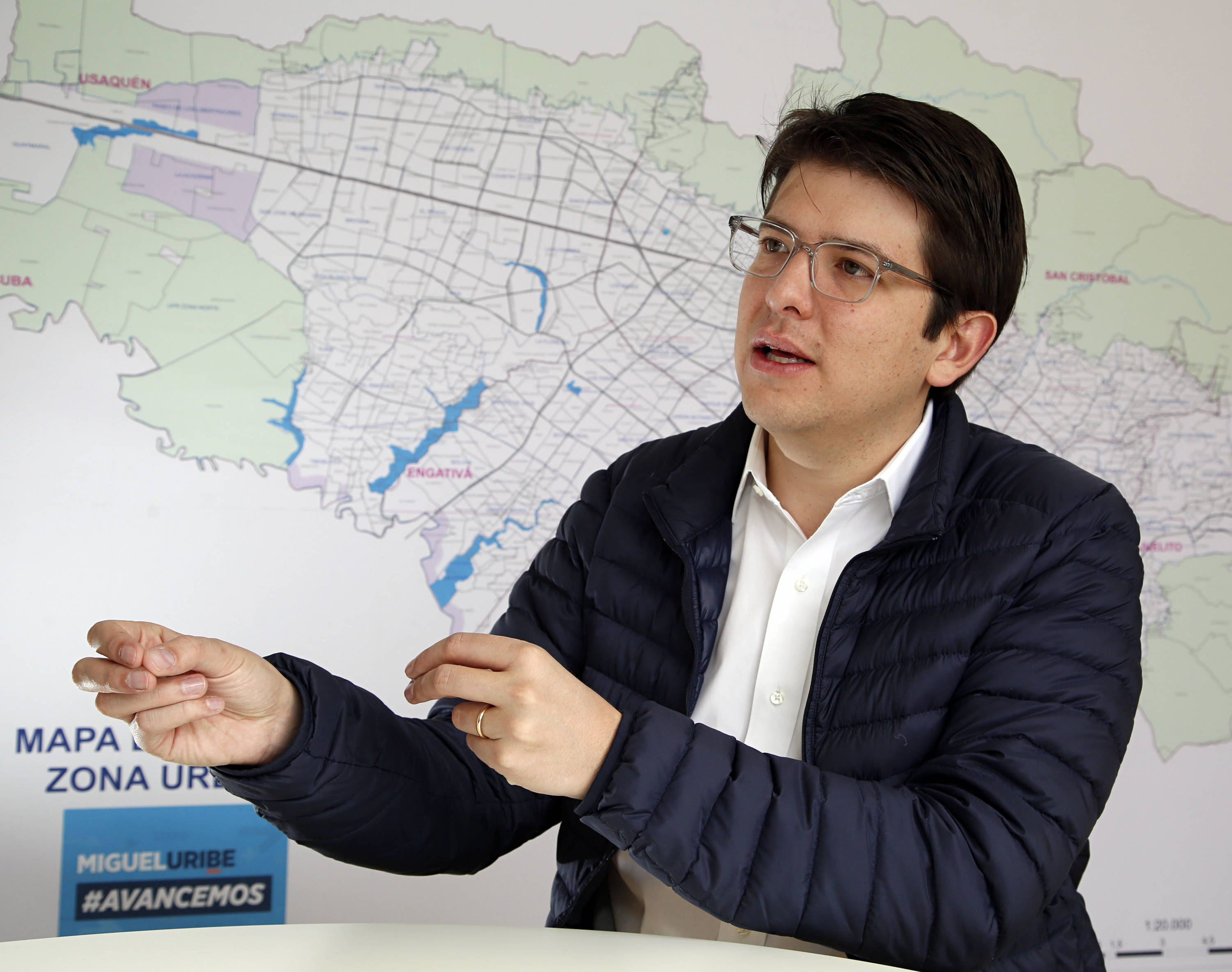
Senator Miguel Uribe leads the voting intentions. Photo: Milton Díaz. EL TIEMPO
Sergio Fajardo and Daniel Quintero are next on the list, with 8.7 percent and 8.1 percent, respectively.
Both former Bogotá mayor Claudia López and the "None" option obtained 5.3 percent in the Guarumo and Ecoanalítica survey.
Then there are figures such as Senator María José Pizarro; the director of the New Liberalism movement, Juan Manuel Galán; former Vice President Germán Vargas Lleras ; and Senator Jota Pe Hernández.
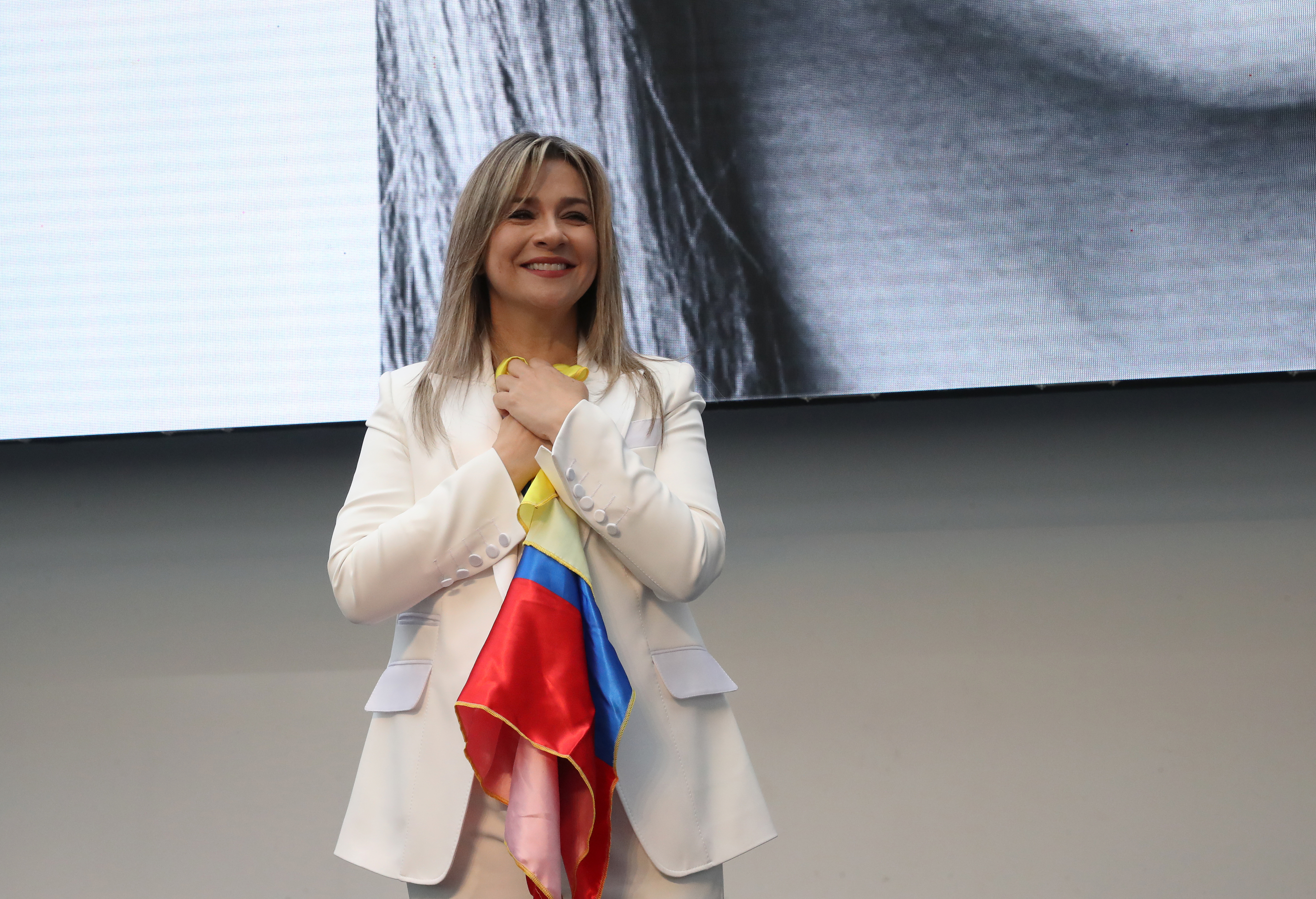
Journalist Vicky Dávila scored 11.5 percent. Photo: Valientes Movement
This is how voting intentions are going, according to the Guarumo and Ecoanalítica survey:
- Miguel Uribe: 13.7 percent.
- Vicky Dávila: 11.5 percent.
- Gustavo Bolívar: 10.5 percent:
- Sergio Fajardo: 8.7 percent.
- Daniel Quintero: 8.1 percent.
- Claudia López: 5.3 percent.
- María José Pizarro: 3.2 percent.
- Juan Manuel Galán: 3.0 percent.
- German Vargas Lleras: 2.9 percent.
- Jota Pe Hernández: 2.5 percent.
- Carolina Corcho: 2.4 percent.
- Juan Daniel Oviedo: 2.2 percent.
- Ivan Cepeda: 2.1 percent.
- María Fernanda Cabal: 1.9 percent.
- Susana Muhamad: 1.7 percent.
- David Luna: 1.2 percent.
- Abelardo de la Espriella: 1.1 percent.
- Mauricio Cárdenas: 1.0 percent.
- Roy Barreras: 0.9 percent.
- Alejandro Gaviria: 0.7 percent.
- Paloma Valencia: 0.7 percent.
- Daniel Palacios: 0.6 percent.
- Camilo Romero: 0.5 percent.
- Luis Gilberto Murillo: 0.5 percent.
- Mauricio Lizcano: 0.5 percent.
- Enrique Peñalosa: 0.5 percent.
- Anibal Gaviria: 0.5 percent.
- Jaime Pumarejo: 0.4 percent.
- Felipe Cordoba: 0.4 percent.
- Luis Carlos Reyes: 0.4 percent.
- Juan Guillermo Zuluaga: 0.4 percent.
- Carlos Caicedo: 0.3 percent.
- Santiago Botero: 0.3 percent.
- Andrés Guerra: 0.2 percent.
- Francisco Barbosa: 0.2 percent.
- Guardian Angel: 0.1 percent.
- Juan C. Cardenas: 0.1 percent.
- None: 5.3 percent.
- NS/NR: 3.5 percent.
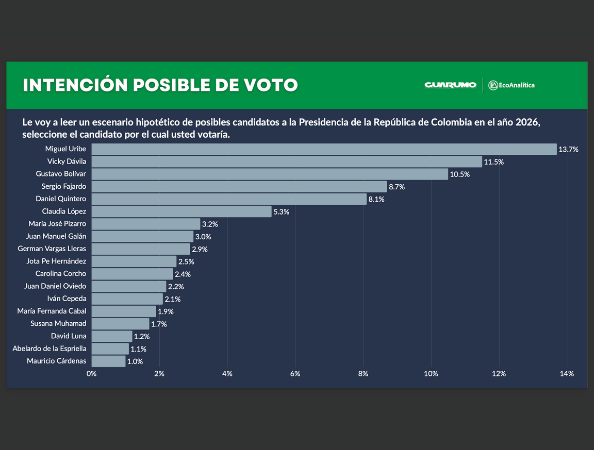
Guarumo Survey Photo: Guarumo Survey
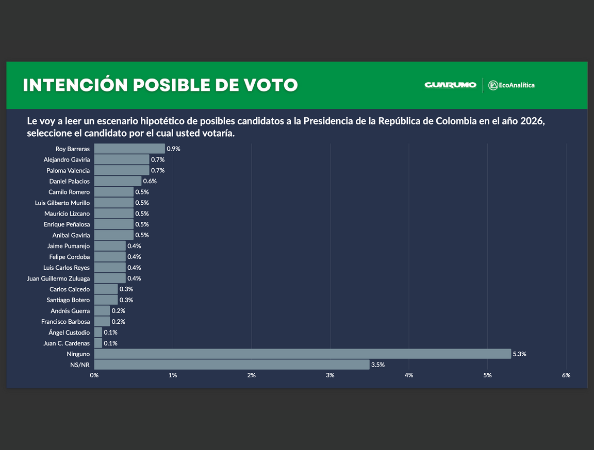
Guarumo Survey Photo: Guarumo Survey
The survey also explored citizens' preferences in the event of a referendum between candidates from the Historic Pact, the center, the center-right, the Democratic Center, regional parties, and political parties.
According to the results, those who would participate in a possible consultation between candidates of the Historic Pact would mainly opt for Gustavo Bolívar (29.2 percent), followed by Daniel Quintero (20.0 percent), María José Pizaro (16.7 percent) and Iván Cepeda (10.7 percent).

Gustavo Bolívar received 10.5 percent. Photo: César Melgarejo/El Tiempo
In a poll among centrist candidates , Sergio Fajardo would lead with 33.9 percent, followed by Claudia López (18.6 percent), Jota Pe Hernández (14.2 percent) and Juan Daniel Oviedo (8.8 percent).
In a poll of center-right candidates , Vicky Dávila leads the poll with 51.9 percent, while Germán Vargas Lleras (20.1 percent), Abelardo de la Espriella (9.1 percent), and Daniel Palacios (7.1 percent) are also among the most mentioned.
In a poll among candidates from the Democratic Center, Miguel Uribe would be elected with 74.4 percent, followed by María Fernanda Cabal (11.4 percent) and Paloma Valencia (6.9 percent).
In a survey of regional candidates , Aníbal García would be in first place with 25.4 percent, followed by Jaime Pumarejo (22.0 percent) and Enrique Peñalosa (18.3 percent).
Finally, in a consultation of political party candidates , the results would be as follows: None (59.3 percent), Ángel Custodio Cabrera (12.3 percent), Felipe Córdoba (11.9 percent), Francisco Barbosa (8.5 percent) and Rubén Darío Lizarralde (8.0 percent).
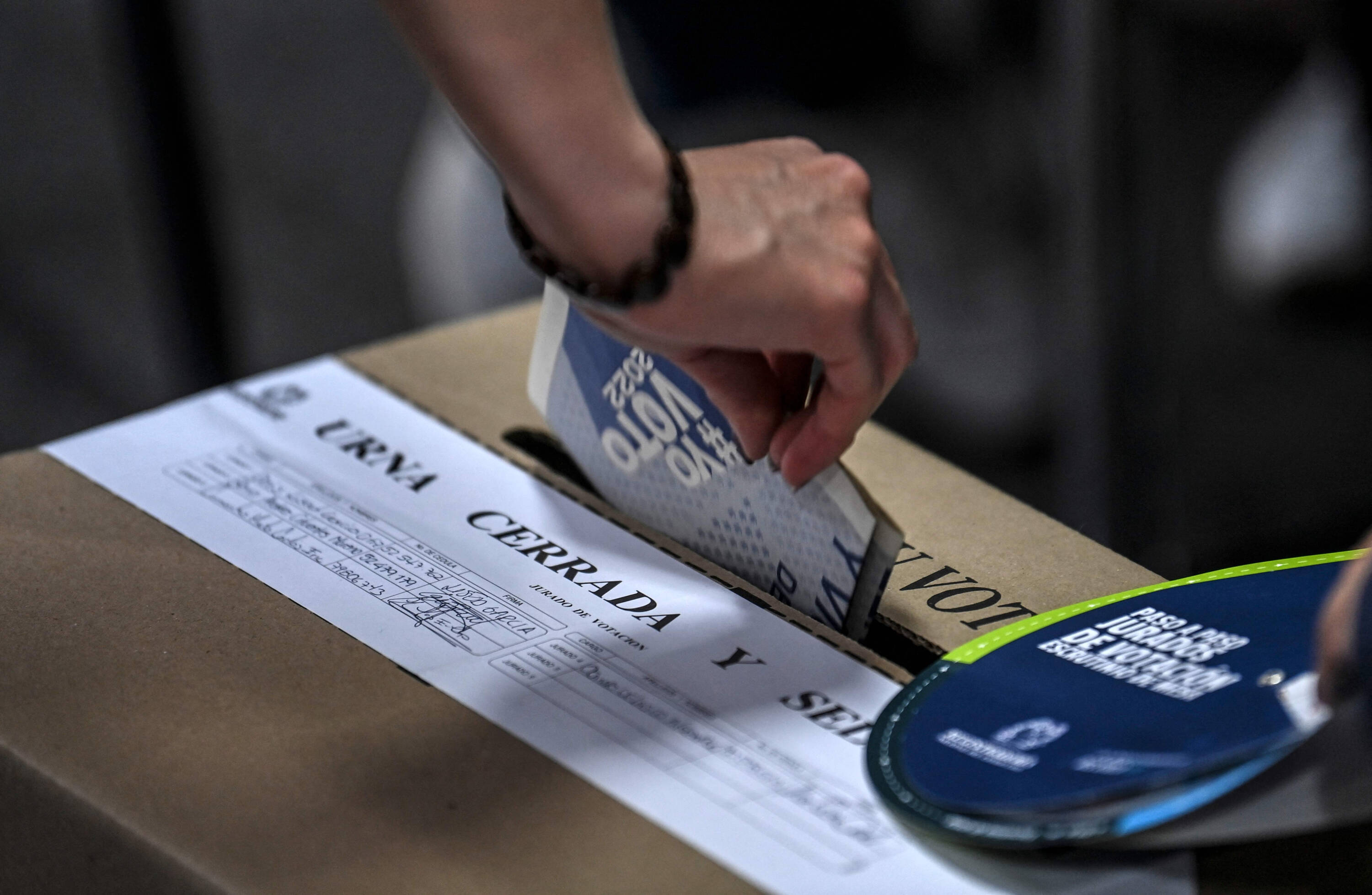
Elections in Colombia. Photo: Yuri Cortez / AFP
In addition to investigating the electoral landscape ahead of the 2026 presidential elections, Guarumo and Ecoanalítica also surveyed respondents about Gustavo Petro's term in office.
When asked how they rate his performance, 30.3 percent considered it good, while 26.6 percent rated it as terrible, and 23.7 percent said it was bad. 8.4 percent responded that it was excellent, and 11.0 percent selected "Don't know, no answer."
Regarding the current situation, the pollster also asked: Do you agree with the convening of a National Constituent Assembly in Colombia ?
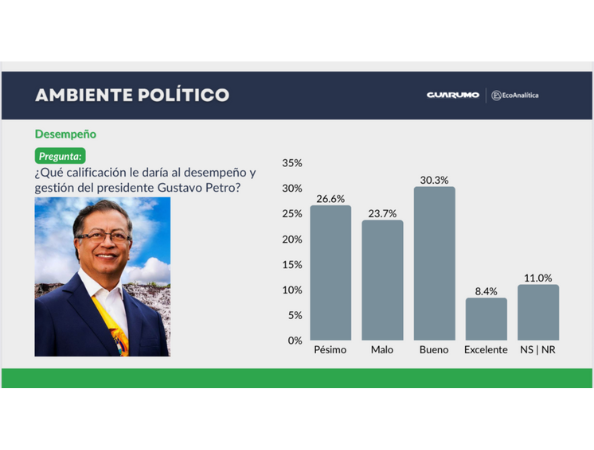
Guarumo Survey Photo: Guarumo Survey
Regarding this question, 53.9 percent answered no, 31.3 percent said yes, and the remaining 14.9 percent selected 'Don't know, no answer.'
Guarumo and Ecoanalítica also investigated the main concerns of Colombians, revealing that access to healthcare, insecurity, and the cost of living are the issues that generate the greatest concern among the population today.

One of Colombians' main concerns is access to healthcare. Photo: iStock
- Legal Entity that conducted the survey: Guarumo and EcoAnalítica Medición y Conceptos Económicos SAS Resolution 4899 of 2023 of the CNE and Resolution 4905 of 2023 of the CNE.
- Legal entity that commissioned it: Guarumo.
- Source of funding: Guarumo.
- General objective: questions about favorability, perception and hypothetical electoral scenarios.
- Study universe: Colombian men and women over 18 years of age, from all socioeconomic levels, residing in the national territory except for the so-called former national territories and the San Andrés archipelago, and who have voted, for a total of 37,000,000 Colombians.
- Sample design: The sample design is probabilistic in stages.
- Sample size: 2122 surveys distributed as follows: Armenia (32), Barranquilla (157), Bello (16), Bogota (387), Bucaramanga (98), Buenaventura (27), Cajica (28), Cali (130), Cartagena (113), Codazzi (34), Cucuta (40), Dosquebradas (43), Envigado (32), Floridablanca (44), Funza (39), Giron (55), Ibague (53), Itagui (6), Jamuni (26), Madrid (33), Manizales (54), Medellin (121), Montelibano (35), Mosquera (43), Neiva (17), Palmira (22), Pasto (29), Popayan (46), Riohacha (37), Santa Marta (44), Sincelejo (65), Soledad (29), Tolu (60), Turbaco (28), Villavicencio (27), Virginia (44), Yumbo (28).
- Collection Technique: in-person household survey.
- Collection Date: July 1 to July 5, 2025.
- Personalities investigated: refer to the collection form.
- Margin of error: 95 percent confidence level. Total national margin of error: 2.2 percent.
- Sample distribution: Surveys were conducted according to the population census, broken down by municipality, socioeconomic stratification, locality, neighborhood, block, and population over 18 years of age.
- Sampling frames: National Population Census – Electoral Potential.
- Specific questions asked: refer to the collection form.
DIGITAL REACH EDITORIAL
eltiempo





